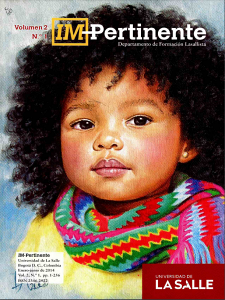Abstract
In the context of a research on the modalities assumed by the political subjectivity of young people from Córdoba, Argentina, with different social backgrounds, this paper focuses on a sample of middle class students from two universities in the region. Political subjectivity articulates symbolic, affective and evaluative dimensions, understood as tension with recent historical and social contexts that have been socialized and with the memory of the militant commitment from previous generations. In-depth interviews and focus groups of young students were included as a qualitative methodological strategy. The symbolic place where they are located in the public and images built of themselves in the world —cores of meaning that have been included in the social identity category— are articulated in two forms of political subjectivity: one prone to apathy and delegation, and another one prone to involvement and the search for alternatives to traditional politics. As a plausible hypothesis, it is proposed that these features are related to the profile of the chosen university career.Downloads
Download data is not yet available.



